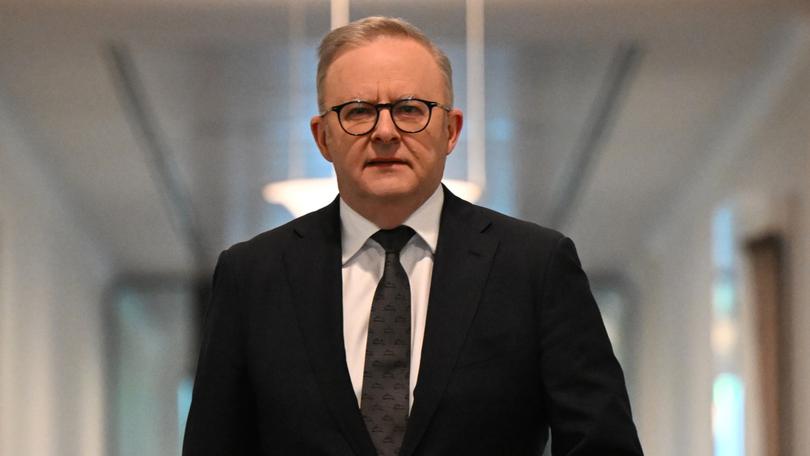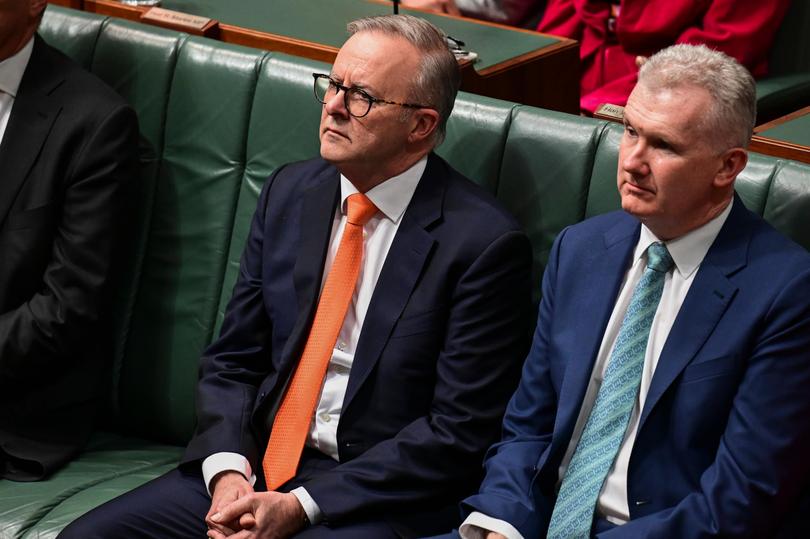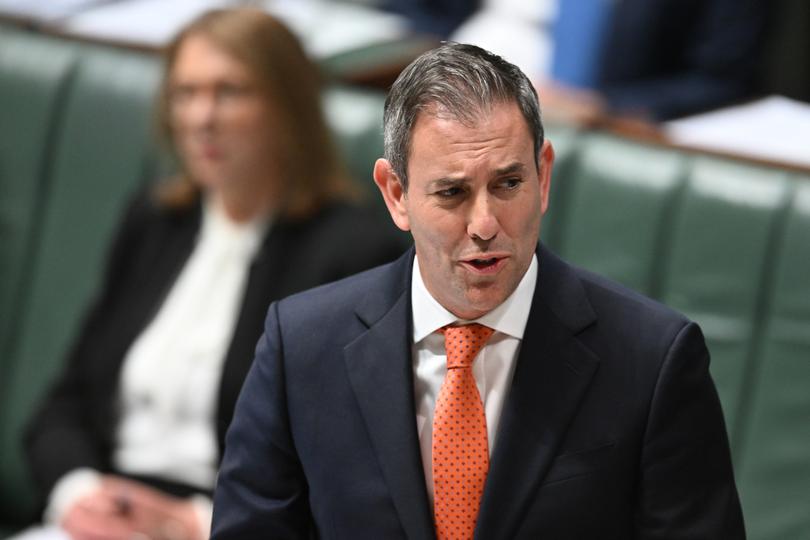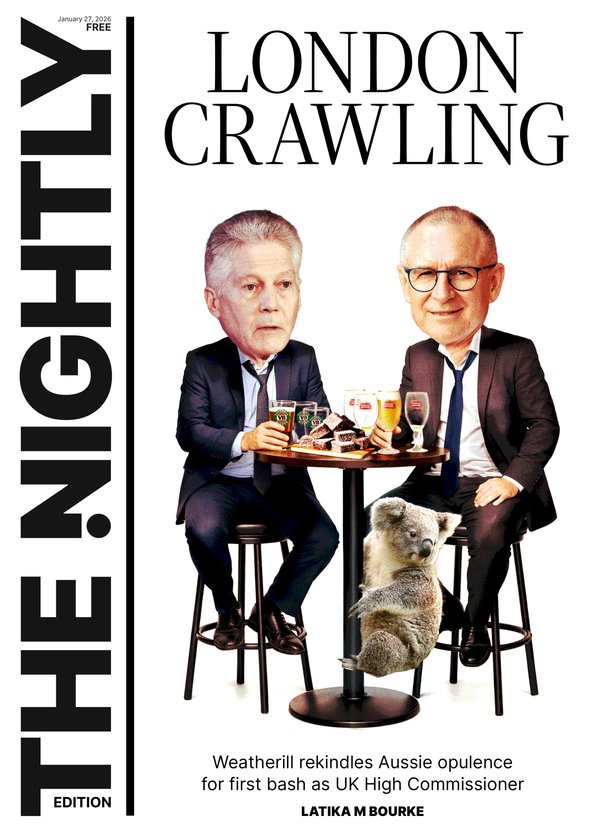PAUL MURRAY: Anthony Albanese putting Tony Burke in charge of immigration a reminder of dark days of Rudd

By any measure, Tony Burke’s elevation to head a new super-ministry supposedly recombining immigration control with border protection responsibilities is a curious move.
The last time a desperate prime minister sent Burke to immigration was just before the 2013 election when the flood of boat people directly caused by Labor policies — and exacerbated by a series of discarded useless ministers like Chris Bowen — was a red-hot issue.
Burke held the job for just four months, made a further mess of it and Labor lost the election.
Sign up to The Nightly's newsletters.
Get the first look at the digital newspaper, curated daily stories and breaking headlines delivered to your inbox.
By continuing you agree to our Terms and Privacy Policy.So why has Albanese chosen him? There are many potential answers.
Labor is once again under pressure over immigration and home affairs for its handling of criminal illegal-entry detainees, who were released by a High Court order, and the runaway inflow of migrants.
The Burke move is a tacit admission that Andrew Giles and Clare O’Neil were not up to the job, even though the Prime Minister is in denial.
But a sense of deja vu hangs over this whole reshuffle because everyone knows it’s true. When Albanese’s judgment and credibility are under such broader scrutiny, why would he bother?
Back in 2013, Labor MPs were so desperate about their re-election prospects that they sacked Prime Minister Julia Gillard in June and replaced her with the recycled Kevin Rudd.
Rudd then made Burke the immigration minister, ousting Gillard-supporter Brendan O’Connor, who had replaced the hapless Bowen only four months before after a disastrous 29-month stint in the job.
To get a sense of the moment, this is what refugee advocate Fr Frank Brennan, then a professor of law at the Australian Catholic University, said about it:
“There is no doubt that the 2008 reforms instituted by the Rudd Government contributed to a sharp increase in the arrival of boat people. The annual arrivals continued to spiral upwards — from 2856, to 6689, a brief drop to 4730, then up to 17,271, and then up again to 25,145.
“By the time Kevin Rudd had become prime minister for the second time in June 2013 the boat arrivals were running at 3300 per month (40,000 per annum).”
That’s the facts, Jack.
Within a month, Rudd and Burke contrived what was known as the PNG Solution, which they promised meant that no asylum seeker arriving by boat would be allowed to resettle in Australia after being sent to Papua New Guinea for processing.
“Our country has had enough of people smugglers exploiting asylum seekers and seeing them drown on the high seas,” Rudd said when announcing the policy, which was immediately attacked by the Left as draconian.
Rudd has no sense of shame. Empty.
On the ABC’s 7.30, Burke was asked if the policy reflected Labor values: “The principles that I joined the Labor Party for did involve making sure that you don’t see the sorts of horrors that we’ve seen in the Indian Ocean.”
It took five full years in government for those principles to kick in. Apparently.
Discard the warped narrative offered on the letters page this week that parties other than Labor were to blame for overturning John Howard’s successful policies. It was all Labor’s own work, as Fr Brennan attested.
Rudd came to power in November 2007, and by the following July his Immigration Minister, WA’s Chris Evans, boasted about dismantling Howard’s policies. He labelled the Coalition strategy “a cynical, costly and ultimately unsuccessful exercise”.
But back to Burke. On August 4, 2013, Rudd called the election, and 18 days later, when asked about the effect of his new PNG-based people smuggling policy, Burke conceded the arrivals remained very high.
Modern voters love lashing bad governments, but they also don’t like to admit their mistakes after only one term.
“But let’s not forget those figures include people who are already at sea,” Burke protested. The policy was already five weeks old.
Australians didn’t buy it — a record-breaking 83 boats arrived during Burke’s 80-day tenure — and on September 7, 2013, Tony Abbott’s coalition won in a landslide, only the third time an incoming government had taken more than 90 seats.
Much of Abbott’s win was put down to his relentless “stop the boats” mantra which Burke’s elevation and his PNG Solution failed to neutralise. It was as ineffectual as the Gillard government’s illegal Malaysia Solution, struck down by the High Court two years beforehand.
The Abbott government quickly formed the Department of Immigration and Border Protection with Peter Dutton as the minister, strongly focused on ending the asylum seeker tide. It was later changed to Home Affairs by Malcolm Turnbull.
Now, with another election looming, Burke is back in the hot seat, but this time with expanded responsibilities.
Albanese’s move to give him immigration, home affairs and multicultural affairs is intensely political with a keen eye on the challenges Labor faces from a growing and agitated Muslim population — mainly in western Sydney where Burke’s own seat is under threat.
Burke’s workload has been lessened by moving ASIO out of home affairs to the uber-political Attorney-General, just like Albanese did with the Australian Federal Police on coming to power.

Labor has now gutted the powerhouse of the Coalition’s successful integrated border protection creation. Deja vu all over again.
So is Burke up to this big new job? Did his performance as industrial affairs minister give any indications that he could get on top of such a difficult task?
A perceptive Labor strategist with whom I speak often says the public has no interest in Cabinet reshuffles. And he might be right. They just hope competent people are running the show.
But the public should be interested in what the reshuffle tells them about how the Government is travelling. And this one shows Albanese has internal problems.
Albanese’s promotion of government unity and stability — celebrated by beltway media commentators who should know better — is only useful to voters if it creates results. He isn’t and his backbench knows it.
A key element in this reshuffle is Albanese drawing potential underminers closer to his inner circle. Principally Burke.
During his tenure in industrial relations, Burke made few friends in the business community with legislative changes mainly delivering on trade union demands.
But that did him no harm in Labor circles. He has emerged as the strongest Cabinet performer from Labor’s Right, an important consideration given the current internal state of play.
Albanese, from the NSW Left, has brought the key ministerial player from the NSW Right closer and made him much busier, but also less influential among the union leaders who control Labor.
The Prime Minister struggles to overcome criticism that he is weak, but his political instincts, borne of a long career in factional clinches, are still strong.
Consequently, Albanese wants Burke inside the tent as much as possible. Elements of Labor’s Right outside NSW, especially in Bill Shorten’s Victoria and rebellious Queensland, remain restless.
The move Albanese should have made — but never will — was to shift Jim Chalmers. As I have argued from the outset, the bloke is a posturing dud, a political theoretician with no economic nous.
The single biggest issue threatening Labor’s chances of re-election is its handling of the economy — and the Treasurer must take most of the blame for the “sticky” inflation that is causing so much household pain.
Despite this week’s increasing inflation figures being perversely touted as not tempting the Reserve Banks to lift interest rates soon, the reality is that they will not fall this year as they have in other comparable economies.
The pain continues. And the reason is that Chalmers keeps fuelling inflation. He has had three Budgets to drive it down and squibbed the challenge each time.
One of the biggest contributors to this week’s increased headline inflation figure of 3.8 per cent was the six per cent rise in electricity charges.
Take note. The increase would have been 14.6 per cent without Labor government handouts. Labor is spending your money to obscure the economic realities.
Wake up.

Albanese pledged to lower domestic power costs, but has been unable to restrain even the rising rate of their increase. What chance of the promised $275 cut this term? None.
However, Albanese keeps open the option of an early election, scraping off some barnacles and better prepared to go to the polls quickly.
He might want to catch the Liberals flat-footed because Dutton has offered very little other than a politically risky nuclear power policy. And the coalition has done little to convince people even about that.
While conventional political wisdom might be to hold back crucial policies until the election campaign, Dutton’s Coalition has shown no indications of any zingers in the works.
Modern voters love lashing bad governments, but they also don’t like to admit their mistakes after only one term. Dutton will have to offer them more than just pointing to Albanese’s obvious failings.
A Greens-backed minority Labor government — rewarding one which has failed to make life better for families in three years — still looms unless WA turns.
